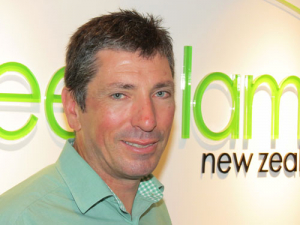Beef + Lamb NZ’s chief executive has made a stinging attack on Britain and the European Union over their plans to introduce inflexible quotas for sheepmeat to the two entities when Brexit occurs.
Sam McIvor says they seem to have “conveniently short memories” over a deal struck by the EU, UK and NZ via the World Trade Organisation (WTO) when Britain joined the EU.
McIvor, just home from talks in Canada and Europe with farming groups and officials, says the EU and the UK are completely ignoring protests by NZ to honour the original WTO agreement. They need to understand they have obligations, he says.
The WTO agreement specified that NZ would have access for 228,000 tonnes of sheepmeat and 1300 tonnes of beef and that this could be spread flexibly across the whole of the EU. But the UK and EU are saying that the quota will be split 50/50 when Brexit finally takes place.
“It seems like the EU and the UK are just throwing a legal agreement out the window and saying it doesn’t matter,” McIvor told Rural News.
“Well it absolutely does matter to us. It is a legally binding deal under WTO rules and both sides made choices at the time and they need to honour that.”
McIvor says before Britain joined the European Economic Community in 1973, NZ was sending at least 300,000 tonnes of sheepmeat and 14,000 of beef to Britain – and this was pretty much a UK/NZ free trade agreement. When Britain joined the EU, NZ clearly had to make huge concessions and the other two parties need to remember this, he says.
“These people are tending to forget that we have been exporting sheep and beef products to the EU for over 130 years. For many years, we were the extension of the UK food basket and at one stage were exporting around 90% of the sheepmeat we produced to the UK. The relationship we have with the EU and the UK should not be forgotten and they should remember that it was very painful for us when the UK joined the EU and our industry had to dramatically change to cope with this.”
McIvor says to its credit the NZ primary sector has moved on and now exports to 120 countries, having doubled the exports from its sheepmeat industry.
But he says the EU and UK are ignoring that the 50/50 split in the tariff rate quotas will result in a ‘lose-lose-lose’ situation and that this could cause massive disruption in the UK and EU markets.
“It will be a loss for UK and EU farmers and it’s very likely to be a loss for the consumers because they will have the disruption of either price or availability of product,” McIvor explains. “Ultimately that disruption of the market place is going to be a loss for us as well.
“The present arrangement creates a stable market for everyone and ensures that the product is available consistently and at a reasonable price to consumers in all those countries.”
McIvor says Britain is in difficulty over Brexit and has hard decisions to make. However, it appears the UK wants all the trappings of the EU and still wants to enter into the world of free trade.
“You can’t have both. I am not sure that the UK has grasped what it’s like to be a free trading nation. In my view, they are walking a bit of a tightrope.”
McIvor points out the importance to NZ of the UK/EU market. At $1.8 billion it’s the largest market for red meat and associated products. The EU is the largest for sheepmeat at $1.3b and the UK is NZ’s second largest sheepmeat market bringing in $445m annually.
Irish concerns
McIvor says there seems to be a misunderstanding about the WTO deal with NZ.
However, many farmer groups – especially the Irish – are totally focused on their own survival.
McIvor believes the Irish are probably more affected than anyone else by Brexit. This is because the UK is the main market for their beef and most of the agricultural products they send to the continent are transhipped through Britain.
“They are most fearful of the potential for a hard border between the north and south of Ireland. A lot of the infrastructure exists as one and if a hard border is put in place it will disrupt both economies quite significantly,” he says.



















